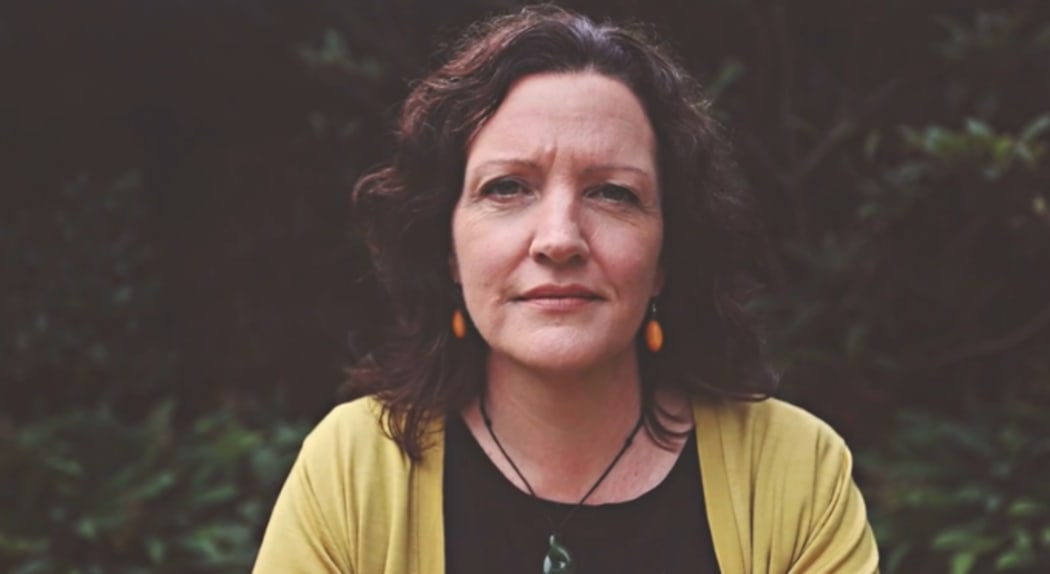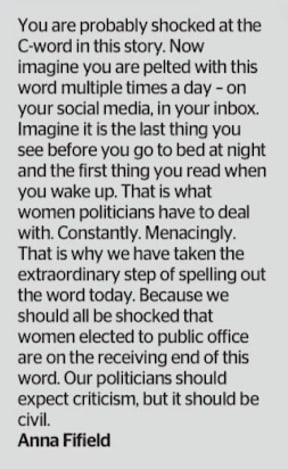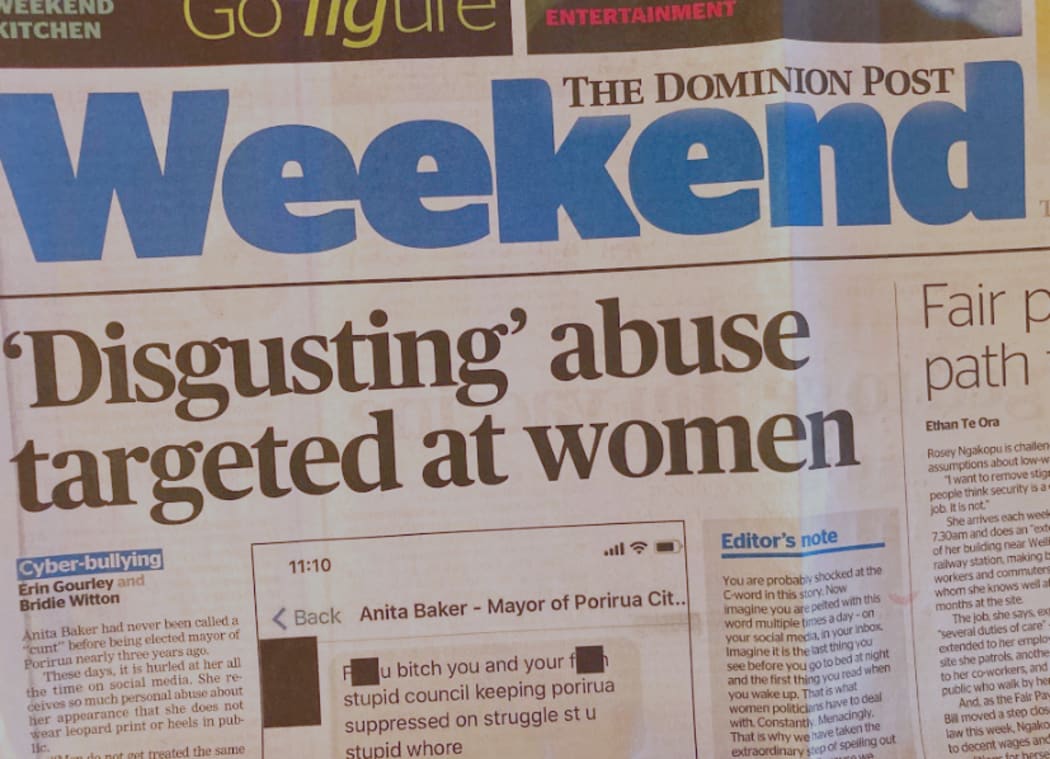Online abuse of politicians is on the rise - especially for women, including the PM and local councilors. This week one was able to unmask her anonymous abuser and the media played a part. But this weekend The Dominion Post showed vividly that there's plenty more where that came from - and the media face awkward choices about online trolling designed to damage political opponents.

Sara Templeton - telling Stuff about unmasking her online political troll. Photo: screenshot / Stuff
This weekend The Dominion Post startled readers of the print edition by publishing on its front page a word recently deemed the second-most offensive to Kiwis by a Broadcasting Standards Authority survey:
“Anita Baker had never been called a c... before being elected mayor of Porirua nearly three years ago. These days, it's hurled at her all the time on social media.”
While the c-word was sanitized like that for readers of the online version, editor Anna Fifield spelled out for Dom Post readers exactly why she spelled out in full in a front page.

Dominion Post editor Anna Fifield explains to reader why the paper put the 'c' word on the front page this weekend. Photo: photo / RNZ Mediawatch
“You are probably shocked, she said. But imagine you are pelted with this word multiple times a day - on your social media, in your inbox,” she wrote.
“Imagine it is the last thing you see before you go to bed at night and the first thing you read when you wake up. That is what women politicians have to deal with. Constantly. Menacingly,” she wrote.
Other local politicians - all women - also detailed similar online abuse in that front page story that they’ve received recently.
But it’s clearly not just an issue in and around the capital.
This week Stuff reported a campaign of misogynistic online trolling and politically-damaging rumours targeting left-leaning female politicians. It originated from a house owned by a Young Nat and prospective community board candidate.
The culprit turned out to be a housemate - Jessee McKenzie - who operated fake online accounts for the trolling.
One of his targets - a local councillor Sara Templeton - succeeded in unmasking the source of the online abuser.
Templteon told Stuff it was when she first aired the problem in their pages last year that the trolling stopped.
But she following up using the Harmful Digital Communications Act - and Stuff following up on the outcome of tht eventually exposed the culprit this week.
The process wasn’t quick but in the end it was effective - and hopefully can be also for other people in public life who bear the brunt of this sort of abuse online
The real name of Jessee McKenzie has been dragged out of the online shadows and into the headlines, along with that of housemate Bryce Beattie (who initially told the media he didn't know what McKenzie was up to online and has since decided not to stand in the local elections himself in six months’ time).
For the fake online account named ‘Hamish Eggstein’ Jessee McKenzie even pinched a picture of 62-year-old Cyril Lawless who lives in Riverton.
“I don’t like it at all,” the startled man told Stuff on Thursday
“If you’re going to give someone a hard time, do it to their face,” he said
And the fact that the two housemates in question were actually Young Nats gave the story extra political legs.
(A small irony here: Sarah Templeton - a former high school teacher - was a strong backer of the bid to lower the voting age to boost young people’s participation in our politics.)
‘Eggstein’ had also been urging National MPs and candidates to get in touch online to amplify his attacks - and that cast suspicion on a party that’s had Dirty Politics problems in the not so distant past.
National’s deputy Nicola Willis walked a bit of a fine line when she told ZB’s Mike Hosking such behaviour was a problem “on both sides of politics.”
But Willis was backed up on that on by Labour’s Megan Woods - another target of Jessee McKenzie - when she spoke to RNZ the same day.
But as the editorial in The Press and other Stuff papers around the country pointed out this weekend: “Puerile attacks on women politicians are not limited to the young.”
National MP Michael Woodhouse was well into his 50s when he displayed a toilet seat with a picture of former Labour MP Clare Curran on it, the editorial said.
Media pleas to dial down rhetoric

The Dominion Post details the online abuse targeting local councilors. Photo: photo / RNZ Mediawatch
Today FM afternoon host Lloyd Burr told his listeners this week he was worried about an uptick in political aggro.
“Politics has become so personal and hateful and ugly,” said Burr, a political reporter for TV3 for five years up until 2018.
“There is so much vitriol and hate directed at the government at the moment - and at the opposition - and much of it feels like mis-directed anger, or scapegoating, or blame for blame's sake,” he said.
Fellow Today FM host and former political editor Tova O’Brien told him toxicity was definitely on the up, but she blamed a hyped-up small minority.
In last weekend’s Sunday Star Times - under the headline 'The culture of nastiness' - senior political journalist Andrea Vance said insults have replaced arguments in political debate.
And journalists like her know how politicians feel.
Like them, they also work in a competitive environment - but believe they are working for the good of the people.
They both need the trust and support of the public - and both are copping more and more wretched abuse and blame from people who have lost the plot these days.
Social media is the accelerant of all this, said Vance.
But her main point was that politicians are reflecting the online nastiness.
She gave examples from just the previous week:
ACT leader David Seymour made “a nasty personal attack" on microbiologist Siouxsie Wiles; Te Pāti Māori called ACT Party MP bigots; National Party leader Christopher Luxon characterised the poor as “bottom feeders.”
Vance also pointed out that the departed Simon Bridges had written movingly about how mockery of his Kiwi accent affected him badly.
But sometimes the media also seize on ramped up rhetoric and mockery from politicians.
Tova O’Brien’s first Today FM show last week closed with a spoof song mocking that accent in a big way - singling along to Bowie’s China Girl
The show ended its first week on air with a spoof song about the malicious rumours on social media targeting the PM and her partner.
That song mocked the paranoid people spreading those malicious rumours - not the PM’s and her partner - but the nervous laughter at the end hinted at the feeling that went a little close to the edge.
It was the only instance Mediawatch is aware of where those specific social media slurs were actually aired by a mainstream news media outlet.
In the end though no bad thing if our media are thinking more deeply about amplifying politically-inspired abuse that’s now increasing in volume - in both senses of the word.


